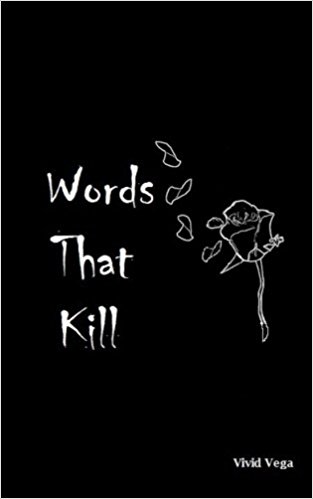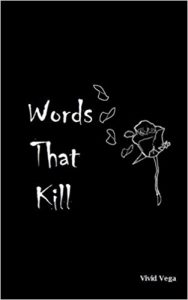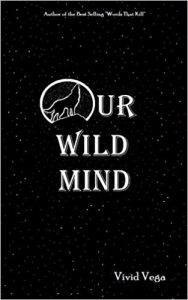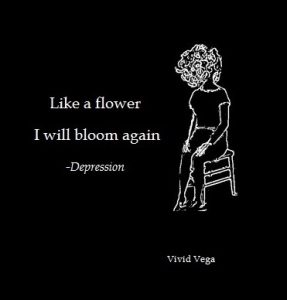Meet Vivid Vega, Poet of “Words That Kill” and “Our Wild Mind” [Interview]

Vivid Vega, a poet of two poetry collections, “Words That Kill” and “Our Wild Mind” kindly allowed us to ask her questions to learn more about her background and writing work. As a community comprised of many who are or have been affected by mental illnesses in their lives, we felt like many can relate or would be interested in learning more about the poems and the creator behind them. Hope you enjoy!
Hi Vivid Vega! Would you please start out by introducing yourself? How would you describe yourself in three words? What are some things you enjoy doing?
 I’m a poet and artist based in Chicago. My first book, “Words That Kill” has been a Best Seller for 40 weeks since its release on Amazon. “Words That Kill” has been successful, but at the cost of having it been written through the worst year of my life where I have gone through the deepest state of depression. I took in all of the pain to the point that I could not handle it and was on the bridge of my school ready to take my life. I stayed because a life depended on me, my puppy Kobe. I would never leave him alone because he is a son to me. My love for poetry is what helped me cope with the pain, and my puppy Kobe has saved my sanity. I decided to share my pain and hope through a physical medium, thus creating “Words That Kill.”
I’m a poet and artist based in Chicago. My first book, “Words That Kill” has been a Best Seller for 40 weeks since its release on Amazon. “Words That Kill” has been successful, but at the cost of having it been written through the worst year of my life where I have gone through the deepest state of depression. I took in all of the pain to the point that I could not handle it and was on the bridge of my school ready to take my life. I stayed because a life depended on me, my puppy Kobe. I would never leave him alone because he is a son to me. My love for poetry is what helped me cope with the pain, and my puppy Kobe has saved my sanity. I decided to share my pain and hope through a physical medium, thus creating “Words That Kill.”
How I’d describe myself is creative, an animal lover, and kind hearted. Art is what makes me feel alive, my dog Kobe is what gives me purpose, and knowing I tried being kind to everyone is what keeps my heart from turning heavy. What I enjoy doing in my free time is going for a run with my dog Kobe, spending time with my parents, going out alone to the art museum here in Chicago, or spending time with loved ones.
What is your educational/experience background in?
I graduated from the University of Illinois at Chicago with my bachelor’s degree in English Professional writing.
When did you first begin writing?
I first began writing poetry as a child. Though I was never introduced to poetry at a young age, I’d like to create stories and would come up with rhyming them. I found passion with this scheme and as I grew older in school and became introduced to poetry. I learned different forms of writing poetry, but none have stuck to me like rhyme scheme does, which has always come naturally to me since I was a child. What made me really start writing poetry frequently, was when I became a teenager and have suffered pain in many forms of abuse, which lead me to become extremely sheltered and I looked for poetry to cope. I was never allowed to have friends as a child, I never learned to truly communicate with people in a way to keep up the conversation, so I was always extremely quiet, I was severely bullied as a child, which made me look for a friend in writing. With poetry I could create a conversation made from my expression without the judgment if it never being good enough, because all forms of art are good enough if it comes from your expression. When I was sixteen, the love of my life passed away, causing me to spiral into a deep depression. Since his passing I had written poetry constantly. I wrote “Words That Kill” my senior year of University experiencing the worst year of my life. Right when I was finally becoming a bit more confident with myself, met friends, and finally started being a bit outgoing, I was sexually assaulted, abused, manipulated, stalked, belittled, and humiliated, and I wanted to end the pain desperately. I wrote poetry to cope with my severe depression and anxiety at that point of my life, but my poetry couldn’t heal my pain. I tried reaching out to professionals, but they could never rip me from the darkness my heart was filled with. I walked out of the school, climbed the bridge, and had a group text ready to send my family on why I decide to end my life. As I looked down to jump, I thought of my puppy Kobe, and how I could never leave him. I went home and apologized to him for ever having the thought of ending my life while he was a part of it. I graduated university with my bachelor’s degree in English professional writing, and with relief, I could not find a job for months. I lost my fear of fear the day I looked down on the bridge and realized how easy it is to end one’s life, but how difficult it is to truly live your life. I quit looking for a job I know I would have absolutely no passion in, because the only thing that has ever made me feel alive is writing poetry. I gathered all of the poems I wrote during that dark year in 2016 and created “Words That Kill.” Since its release, it has been a Best Seller, and I have the most amazing supportive followers that can relate to my work.
What inspires you to write? What are your favorite topics to write about?
What inspires me to write is my expression, artwork, and music. I don’t have a favorite topic to write about, I usually just write whatever comes naturally to me, which is usually of depression, anxiety, love, and hope.
Can you describe what your book “Words that Kill” is about?
 “Words That Kill” begins with the pain, abuse, depression, anxiety, and loss of hope we encounter at one point of our lives, followed by the love, hope and light we find within the darkness. This poetry book is for anyone who has ever felt like the darkness would never subside, who wanted to end their life, who felt happiness would never come back to them, for the lovers, the dreamers, the men and women who thought they were never good enough, for the people who think they can never get out of their bad situation, for anyone who was told they would not succeed, for the ones who think it’s too late to achieve their dreams, to the brave women and men who have experienced sexual assault know you are not alone, and to the ones who felt their voices are never heard. To you all, I say, you are worth it, you are strong, you will get through this, and there will be light. I love you all.
“Words That Kill” begins with the pain, abuse, depression, anxiety, and loss of hope we encounter at one point of our lives, followed by the love, hope and light we find within the darkness. This poetry book is for anyone who has ever felt like the darkness would never subside, who wanted to end their life, who felt happiness would never come back to them, for the lovers, the dreamers, the men and women who thought they were never good enough, for the people who think they can never get out of their bad situation, for anyone who was told they would not succeed, for the ones who think it’s too late to achieve their dreams, to the brave women and men who have experienced sexual assault know you are not alone, and to the ones who felt their voices are never heard. To you all, I say, you are worth it, you are strong, you will get through this, and there will be light. I love you all.
Within the book, what is your favorite poem or the one that you are most proud of?
The poem I am most proud of is all of them as a whole because they are all the reason I am here today. I could never knit pick any piece, because they are a body of darkness, hope, and love. They are what made me who I am, and they are what make me proud to stand here today knowing that I am alive.
How long did it take you to complete the book?
It took me a year to write the poetry in “Words That Kill” from writing out the expression of what had occurred to me throughout the year. The publishing process of formatting, marketing, and design took me four months.
From my understanding, this book connects a lot with psychology, as you touch on topics such as depression, anxiety, abuse, and body dysmorphic disorder. What does psychology mean to you?
What psychology means to me are the mental and emotional factors that make up one’s mind. How one mentally and emotionally are affected by factors and how they react to them are what makes each person unique. The study of the mind is an important factor to our society as well as learning about one’s self.
 I see you also released another poem book, “Our Wild Minds.” How does this collection of poems differ from “Words that Kill?”
I see you also released another poem book, “Our Wild Minds.” How does this collection of poems differ from “Words that Kill?”
“Our Wild Mind” is a short chapbook I created that largely differs from “Words That Kill” since it does not have artwork in each poem, and it is a short read. It consists of three chapters, Our is about the beauty of love, Wild centers on feeling alive, and Mind focuses on not being held back by negative thoughts and feeling free.
Have you noticed changes or growth in your work or yourself between the time when you released your first and second book?
Between the time of writing “Words That Kill” and “Our Wild Mind” I was at a healthy point of my life where I felt free, content, and alive. I was filled with love and hope at that point of my life, and I decided to share that love and hope with my readers by creating “Our Wild Mind.” Shortly after I experienced pain again, and I spiraled into a depression once more, using poetry to cope with the pain again. I’ve been using the poems throughout my spiral of depression to create my second poetry book, which will be titled “Words Left Unsaid.”
Does this book also relate to psychology? If so, in what ways?
“Words That Kill” and “Words Left Unsaid” both center on psychology such as depression, anxiety, the contributing factors such as abuse, suicidal thoughts, assault, and not having your voice heard, as well as hope, light, and love.
Can you share with us a little bit about your background working with Psych2Go? When did you start and what did you do?
I worked for Psych2Go for half a year directly for the founder, Tai. I worked in recruiting writers, editing their articles and interviews, managing the editorial email, creating systematic procedures on hiring new writers, as well as producing manuals. I have nothing but respect for Tai and Psych2Go and am an avid reader of their content.
Do you have any advice you could share to our readers?
Advice I would give to readers would be, darkness will always be a part of life, but once you find your light, you will learn to live the life you were meant to live. Never give up. Even if you feel that your voice is not heard, are too afraid to be heard, or feel like your voice does not matter, you must never give up because your voice does matter no matter the darkness that surrounds it. Love and light always, Vivid Vega

Thank you, Vivid Vega, for taking the time to answer our questions! We agree with your advice and are so glad that you were able to elevate your voice to be heard and hope others will be motivated and courageous to do the same. It was very interesting to learn more about your works and the background behind them.
Readers, we hope you enjoyed learning more as well! This was not paid or sponsored; we truly believe that many of you are able to emphasize with her words and find comfort in knowing that others have been through difficult times that they have overcome.
If you are interested in checking out Vivid Vega’s work, they can be found on Amazon:
—
Hello readers and followers of Psych2Go! For those who are subscribed to our weekly newsletter, thank you so much. If you’re not subscribed, then you’re missing out! Every Monday, at 8:00 AM EST, our community manager sends out a curated list of our top performing content that aims to educate you on different psychology topics.




Responses